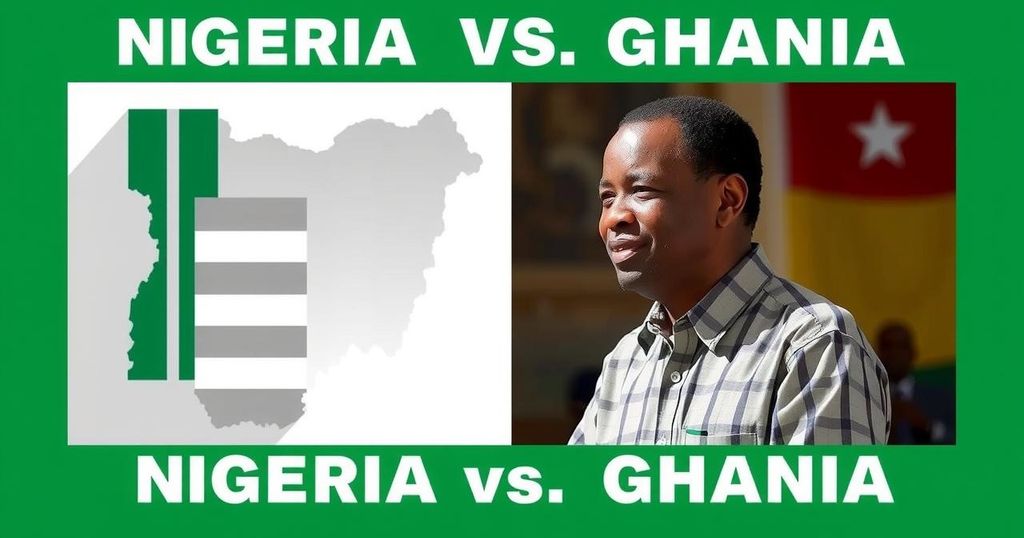Contrasting Electoral Landscapes of Nigeria and Ghana: A Comparison
The political and electoral processes in Ghana and Nigeria reveal stark contrasts, with Ghana successfully holding competitive elections characterized by transparency and civic engagement, while Nigeria continues to wrestle with electoral failures and public disenchantment. Ghana’s recent electoral success stands as a model for Nigeria’s needed reforms in democracy and electoral integrity.
The political and electoral landscapes of Nigeria and Ghana starkly diverge, despite their similar historical timelines of gaining independence. Ghana has demonstrated a robust and competitive political evolution, most evident in their recent elections held on December 7, where former President John Mahama of the National Democratic Congress (NDC) was declared president-elect with 6.32 million votes, representing an impressive 56.55% of the total votes cast. The runner-up, Vice-President Mahamudu Bawumia of the New Patriotic Party (NPP), garnered 4.65 million votes, or 41.61%.
The electoral process in Ghana was marked by high civic engagement, with a voter turnout of 60.9%, and the conduct of elections was characterized by a notable absence of intimidation and violence. In a commendable show of sportsmanship, Bawumia conceded while votes were still being counted, which greatly contributed to maintaining the integrity of the electoral process. In stark contrast, Nigeria’s electoral history has been marred by a series of controversies and allegations of malpractices, including militarization and lockdowns during the voting process, undermining the citizens’ confidence in their elections.
Mahmood Yakubu, Chairman of the Independent National Electoral Commission (INEC), remarked that Ghana had borrowed from Nigeria’s decentralized electoral system. However, Ghana’s successful implementation of this system stands in stark contrast to Nigeria’s continual failures, indicating a critical need for reform in Nigeria’s electoral practices. The African Union Election Observation Mission praised Ghana for its adherence to democratic principles, while the EU Election Observation Mission reported severe deficiencies in Nigeria’s electoral process, emphasizing the erosion of public confidence in INEC.
Furthermore, historical incidents such as the flawed electoral success of late President Musa Yar’Adua and the contentious nature of Nigerian presidential elections illustrate the systemic issues that plague Nigeria’s electoral landscape. Voter-buying and corruption have tainted the political arena, causing Nigerians to continually support the very politicians who exacerbate their struggles. Unlike Ghana, where incumbent parties have faced accountability and electoral defeat due to public dissatisfaction, many Nigerian voters perpetuate a cycle of support for ineffective leadership.
The low voter turnout in Nigeria, recorded at 26.7% during the 2023 presidential elections, starkly contrasts with Ghana’s 60.9% turnout. This discrepancy underscores the urgent need for Nigeria to enhance its electoral integrity, fostering trust among its citizenry. With a focus on law adherence and the strengthening of electoral institutions as demonstrated in Ghana, Nigeria can aspire to improve its democratic practices and restore faith in its electoral system.
This article explores the contrasting political and electoral landscapes of Nigeria and Ghana, two West African nations that gained independence in the early 1960s. While Ghana has maintained a competitive and transparent democratic process, Nigeria’s electoral record has been plagued by issues such as corruption, low voter turnout, and a lack of public trust in its electoral management body, INEC. The discussion highlights Ghana’s recent successful elections and how Nigeria can learn from them to reform its electoral practices.
In conclusion, the electoral comparison between Ghana and Nigeria reveals significant disparities that reflect the broader health of their respective democracies. Ghana’s recent elections exemplify a commitment to transparency and voter engagement, resulting in heightened confidence in the electoral outcomes. Conversely, Nigeria’s continual struggles with electoral integrity highlight a pressing need for reform. By adopting best practices from Ghana, Nigeria may enhance its democratic processes and restore faith in its electoral system, ultimately empowering its populace to hold leaders accountable.
Original Source: punchng.com




Post Comment